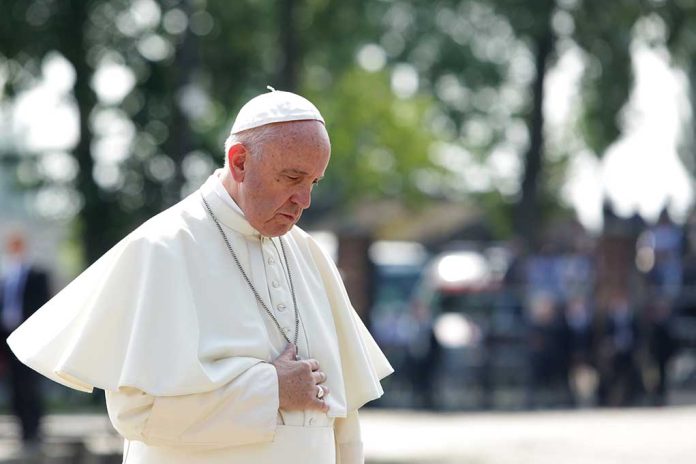
The ecclesiastical landscape faces a stirring debate as Father Giorgio Maria Faré questions Pope Francis’ legitimacy, potentially leading to his excommunication by the Carmelite Order.
At a Glance
- Father Giorgio Maria Faré challenges Pope Francis’ papacy, citing procedural issues related to Pope Benedict XVI’s resignation.
- The Carmelite community demands retraction to prevent Father Faré’s excommunication.
- Father Ramon Guidetti was excommunicated for similar dissent, calling Pope Francis a “usurper.”
- This discourse revisits the implications of papal succession and the validity of pope resignations under Canon law.
A Challenge to Papal Legitimacy
Father Giorgio Maria Faré, an esteemed member of Italy’s Carmelite Order, raised eyebrows by disputing the legitimacy of Pope Francis’ leadership. A fervent critic, Faré claims Pope Benedict XVI’s resignation compromised church doctrine. His views underline perceived lapses in Benedict’s resignation, suggesting these procedural missteps invalidated the power transition. Faré’s assertions align with those who argue the papal succession did not adhere to the correct protocol, sparking debates within ecclesiastical and theological circles.
Citing Benedict’s continued papal attire and title as “Pope Emeritus,” Faré suggests these choices telegraphed an intention to contest the election of a liberal successor. This interpretation taps into the ongoing curiosity and contention regarding the nuances of papal resignation. Remarks from Archbishop Carlo Maria Viganò complement Faré’s stance, though Viganò faced excommunication for similar defiance. Thus, the matter gains traction well beyond Faré’s pulpit in Italy.
Renowned Italian Priest Claims #PopeFrancis Is Not The Legitimate #Pope // #Vatican #CatholicChurch #Catholics #Christianity #Treason #VladimirPutin #Church
https://t.co/LatifIiW5b— Greek News on Demand (@GreekNewsGuy) October 22, 2024
Carmelite Ultimatum and Scholarly Debate
Faré must retract his statements or “incur the very serious penalty of excommunication.” This ultimatum underscores the church’s heavy-handed approach toward dissenters amid disputes over Francis’s papal authority. Dell’acqua, in communicating the order, further emphasizes reconciliation efforts amidst spiritual disputes.
Scholarly voices implore nuanced perspectives. Bishop Athanasius Schneider, for instance, contends that no man has the standing to judiciously declare a pope’s heretical status. Schneider advocates a resistance devoid of declaring papal office nullification, highlighting intellectual discourses that balance tradition, respect, and theological challenge.
The Larger Ecclesiastical Repercussions
This moment is more than a clerical conflict; it’s a reflection of broader ideological divides within the Catholic Church. Pope Francis’s papacy, focusing on contemporary issues such as climate change and social inclusivity, faces pushback from conservative forces desiring traditional adherence. As ecclesiastical disputes unfold, the legitimacy of Francis’ election remains a contentious topic, encroaching on the harmonious tradition the Church seeks to maintain.
“[I]n the case of a heretical pope, the members of the Church can avoid him, resist him, refuse to obey him, all of which can be done without requiring a theory or opinion that says that a heretical pope automatically loses his office or can be deposed consequently.” stated Bishop Athanasius Schneider
The core of this theological impasse lies in the interpretation of ecclesiastical law juxtaposed with evolving church dynamics. The actions undertaken by the Carmelite Order may sculpt not just the fate of a single priest but reverberate through traditions and beliefs cherished by conservative church practitioners worldwide.
Sources:
Italian priest could be excommunicated after claiming Francis is not the pope
Italian priest excommunicated for calling Francis ‘antipope usurper’ during Mass













